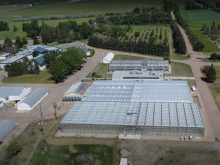One night I dreamed of a giant wave that gathered in the middle of the lake and crashed onto the shore, flowing at the speed of sound up the beach and toward the family cabin.
Where this dream originated, I have no idea. There were no tsunamis in the news at the time and life in Saskatchewan was burbling along reasonably well: no outrageous weather, no flooding.
Of course the dream was ridiculous. Small northern lakes do not gather themselves into standing waves and threaten cabins 50 metres from the shore. Yet it was one of the worst nightmares I have ever had. I woke up drenched in sweat just as the water reached us on the path. I knew, in my dream, we were drowned.
Read Also

Alberta crop diversification centres receive funding
$5.2 million of provincial funding pumped into crop diversity research centres
Horrifically, a wall of water is not just a dream for the people of Japan, although it is certainly a waking nightmare.
The weekend post-earthquake images were shocking, as massive waves pushed vehicles, buildings and everything else in their path as if they were tiny toys.
It defies real understanding if you haven’t been through it and I certainly have never experienced anything so terrifying.
In Saskatchewan, the talk last week was also about flooding. By all accounts, there really was no other topic of conversation at the Saskatchewan Association of Rural Municipalities meeting, and rightly so.
The amount of moisture in the soil, added to the amount of moisture lying on the soil, will be a significant issue in many parts of Saskatchewan and Manitoba.
Make no mistake; I am not downgrading the flooding issue on the Prairies. It could be serious without a perfect melt, and in the wider picture growing food is becoming increasingly crucial in a world of growing populations.
I believe that people must deal with life as they know it, even as other people’s lives explode.
Prairie farmers must deal with a potentially very wet spring, no matter what happens in Libya or Japan or New Zealand. It’s incredibly important work.
Yet it is useful to gain perspective from disasters greater than our own. Japan is our trading partner, the third largest customer of prairie wheat. More important, the Japanese are our compatriots in the human condition. We face great difficulties, but they are facing demolition and death.
I will think of them as our own waters rush in.














